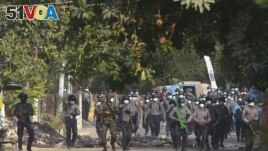01 March 2021
Myanmar's former leader Aung San Suu Kyi appeared at a court hearing using video conferencing on Monday.
Her supporters, however, marched in several towns and cities. They ignored a crackdown following the deadliest day since February 1, the day that the military seized power in the country.
Suu Kyi appeared to be in good health during her appearance before a court in the capital Naypyidaw, one of her lawyers said. Two more charges were added to those already brought against her after the military takeover, she said.

Myanmar riot police crossing a blockage during a protest against the military takeover in Mandalay, Myanmar, Sunday, Feb. 28, 2021. (AP Photo)
"I saw Amay on the video, she looks healthy," lawyer Min Min Soe told Reuters. She used the respectful word for "mother" to describe Suu Kyi, as many people in the country do.
Suu Kyi is a Nobel Peace Prize-winner. She also leads the National League for Democracy (NLD). She has not been seen in public since the military dismissed parliament. She was detained along with other party leaders at that time.
At first, she was charged with importing six illegal communications devices. Later, the charge of violating coronavirus restriction laws was added.
On Monday, two more charges were added. The first was illegally publishing information that may "cause fear or alarm." A lawyer said the other charge was under a telecommunications law that requires special permission for some equipment.
The next hearing will be on March 15. Critics of the military's seizure of power say the charges were false.
‘Severe action'
Police fired tear gas and noise makers to break up hundreds of protesters in the main city of Yangon on Monday, witnesses said. They later searched streets firing rubber bullets. Local media reported that least one person was hurt.
Demonstrators also marched on Monday in the northwestern town of Kale holding up pictures of Suu Kyi. A live video stream on Facebook showed protestors in the northeastern city of Lashio. Police and soldiers later raided a Christian religious center in the town and detained 11 people, a Christian group said in a statement.
There have been protests in Myanmar every day since the military took power after claiming that the November election, won by the NLD, was unfair. The protests are becoming increasingly violent as police and the military try to stop them.
On Sunday, police fired on protestors in several places killing 18 people, the United Nations human rights office said.
"We have to continue the protest no matter what," Thar Nge said after police forced him and others to leave a Yangon street.
"This is my neighborhood. It's a lovely neighborhood but now we're hearing gunfire and we don't feel safe," he added.
The military has not commented on Sunday's violence. Police and military spokesmen did not answer requests for comment. The state-run Global New Light of Myanmar newspaper warned that "severe action will inevitably be taken" against protestors.
The military's takeover brought an end to Myanmar's small steps toward democracy that followed nearly 50 years of military rule. The action has been condemned by Western countries and concern is growing among Myanmar's neighbors.
Foreign ministers from the Association of Southeast Asian Nations (ASEAN) are expected to discuss the situation on Tuesday during a video meeting. Myanmar is a member of ASEAN.
The organization will listen "to the representative of the Myanmar military," Singapore's foreign minister, Vivian Balakrishnan, told parliament. Balakrishnan called for the security forces to stop using deadly force, for Suu Kyi to be released, and for talks to find a way back to democracy.
U.S. Secretary of State Antony Blinken denounced what he called "abhorrent violence" by security forces. Canada's foreign minister, Marc Garneau, called the use of deadly force "appalling."
U.N. special rapporteur Tom Andrews said the international community had to answer Myanmar's military because it will continue to use deadly force. He suggested an arms embargo, more sanctions on military businesses and sending cases to the International Criminal Court.
"We must act," Andrews said in a statement.
I'm Susan Shand.
The Reuters News Agency reported this story. Susan Shand adapted it for Learning English. Mario Ritter, Jr. was the editor.
____________________________________________________________
Words in This Story
crackdown – n. a serious attempt to punish people for doing something this is not permitted; a sudden increased effort to enforce the rule of law
inevitably –adv. in a way that is sure to happen
abhorrent – adj. causing or deserving strong dislike or hatred
appalling – adj. very bad, in a way that causes fear or shock
rapporteur – n. (foreign) a person whose job is to do research and present official reports on a subject
sanctions – n.(pl.) actions taken to force a country to obey international law by limiting or stopping trade or cutting economic aid
We want to hear from you. Write to us in the Comments Section, and visit 51VOA.COM.